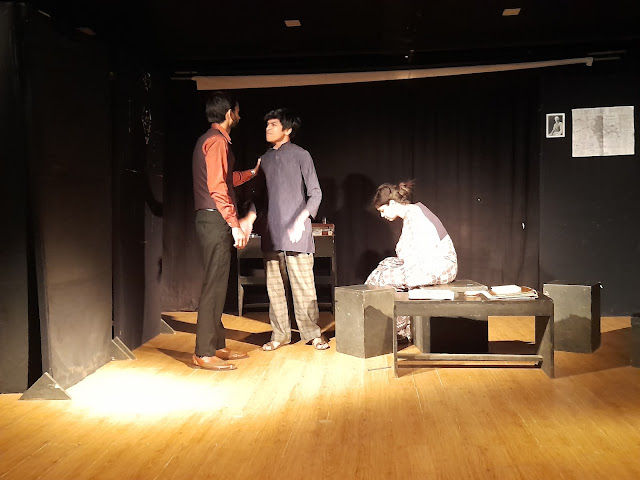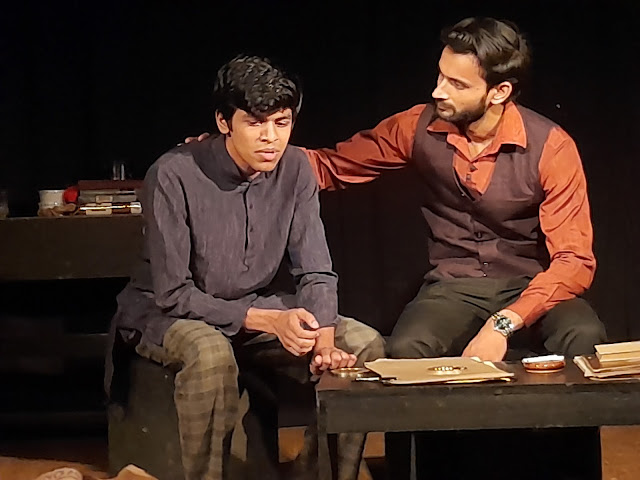The treatment of troubled marriage
( हिंदी में समीक्षा के लिए - यहाँ क्लिक करके क्रम सं. 23 देखिए )
In this era of constitutional rule, as easy as it is to get married, it is a thousand times more difficult to maintain the same.
Alok and Rhuta are well-married. Everything between them is well that is why the relationship is unwell. I mean to say whatever had been well and acceptable between man and woman within an Indian family since ancient time are not so now. The woman creed are full conscious about it's right of equality. If the woman was sitted at a cosy chair, the husband just can't displace her for himself just because he came from his office. Since he came from his office that does not mean his wife can't watch the TV program of her choice. There was a heap of petty issues on which husband and wife clashes but those clashes are so minute and delicate that the audience should be sensitised beforehand to notice them. Otherwise, there are many couples who quarrel more than Alok and Rhuta and still might have come to watch the drama together happily.
The husband thinks the wife is less caring and the wife thinks the husband is paying less attention to her. The quarrel develops and that led them to the brink of divorce. as a last resort to save their marriage they went to a Psychological Therapist who suggests the couple to go for a marriage diet for at least one month. Just as a person has to follow diet for keeping him healthy body so there is also a diet of keeping the marriage healthy. This diet comprises not of menu of food but of prescribed behaviours each of them have to follow. The nitty-gritty of those behaviours includes the bits of romantic actions that add flavour to a conjugal life. A revealing dress-sense, a perfect dose of smile when the hubby returns home from work, a caring attitude and frequent play of love songs at home along with a perfect frequency of eat outs in pleasant restaurants enhances romance in their relationship.
The husband too feels he had been too harsh and lays down his ego. The love rejuvenates and both want to intermingle but suddenly there comes an alert of the undemocratic clause called celibacy for at least for a month.
In love impulses, this clause of temporal celibacy was broken. When at the end of one month, the couple meet the therapist now with a sheepish face, the therapist madam says there is nothing to worry. Restrain in genuine love must to be violeted in a conjugal life.
The story moves on in a streamline motion and never faces a turbulence. I mean if there is a quarrel between husband and wife and and the audience is getting no jerks then what sort of quarrel it is? So friends, the script with pithy dialogues does the trick here.
The script of Manswini Lata Ravindra is vital to carry the show forward. But at the same time we must admit that the conversation between husband-wife can best be written up to half only, the rest has to comes through the accent, pause and body-language of the actors. The director Vijay Kenkre has kept the scene extremely natural purposefully. There were scenes of face-offs but none among them can be categoriesed as a full-fledged encounter.
The sterling chemistry of Rhuta (Rasika Sunil) and Alok (Siddhartha Bodker) was conspicuous even in a troubled relationship. They did good work. Vaishnavi RP as the therapist was also well. But I dare to put a candid word that it was the director who was mostly seen in the actors. The more effective way could have been as let the actors come with his/her own style and mannerism. At the same time, it is also true that, had it be done so then the main theme of remedial conjugal disharmony might have shifted to diagnosis of the relationship problem.
The melodious instrumental music was provided by Anand Oak. The fantastic set of an upper middle-class house and a workable Psychological Clinic was designed by Pradeep Mulye and Akshar Shedge. Majid Khan was the Photographer. The play was produced by Aditya Tushar Suryawanshi and Savita Tushar Suryawanshi.
The show itself seemed to me a Counseling Therapy to viewers who are either passing through the patches of relationship management with spouses or or have to pass.
Review by- Hemant Das 'Him'
Respond to - hemantdas2001@gmail.com / editorbejodindia@gmail.com
















































